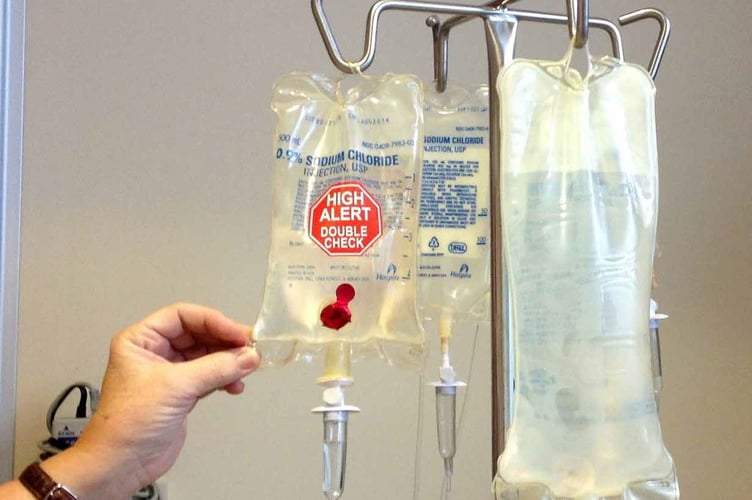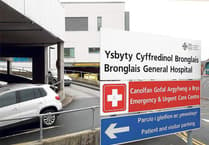Welsh Conservatives are calling for better NHS recruitment whilst Plaid Cyrmu says a “culture change” is what’s needed to reduce the “cruel” cancer wait times.
Last month leading cancer charity Macmillan released damning figures showing roughly only one in two patients are being treated for their cancer on time.
On our first January front-page patients described the “agonising wait” to start treatment, whilst Macmillan branded the 62-day target window for starting cancer treatment set under Welsh Labour as a “cruel fiction”.
Concerning wait times across all conditions, people in Wales are 60 per cent more likely to be on a waiting list than those in England, according to NHS statistics from August 2023.
So what is going so wrong, and what needs to do be done about it?
Missed diagnoses, slow result times due to lack of staff and no cancer services in mid-Wales are all on the minds of Cambrian’s cancer patients.
For grandmother and HR consultant Julie Grabham from Lampeter, Ceredigion, she was left waiting due to the one oncologist in the region being on a family vacation.
Julie from Lampeter, Ceredigion, had decided against seeking private treatment for her breast cancer because she was told she would be treated promptly.
However Julie, 55, said her and her family’s lives were “put on hold” whilst waiting for her results and she was eventually treated with a lumpectomy and radiotherapy 100 days after her cancer was detected during a routine mammogram.
The answer to issues such as Julie faced is in following NHS England’s lead under the English Conservative government, according to Welsh Conservative Shadow Health Minister, Russell George MS for Montgomeryshire:
“It is completely unacceptable that in Labour-run Wales, you have barely a 50/50 chance of receiving cancer treatment within the target time.
“The Labour Government made the decision not to follow the Conservative-run NHS in England to rapidly roll out diagnostic and surgical hubs to bear down on excessive waiting times.
“The result of which are the record waiting lists we now see in Wales, which remain the longest in the UK.
“The Welsh Conservatives want to see a reliable Welsh NHS, with a focus on cancer, resourced with the full Barnett consequential uplift for health and a substantial workforce plan to recruit more doctors and nurses, instead of Labour and Plaid’s plans to create more politicians.”
However the recent six-day junior doctor strike which marks the largest industrial action in the NHS’ history suggests the English Conservative scheme MS George is asking Wales to follow isn’t going so well.
The British Medical Association are asking for full pay restoration on behalf of junior doctors in England since their pay started diminishing against inflation in 2008, the equivalent of a 35 per cent pay increase.
At the time of writing, no resolution had been reached.
Junior doctors argue restoring their pay will incentivize new recruits and protect against more staff quitting, but England’s government say the strikes will only make wait times worse and branded the pay rise unreasonable.
Overstretched GP’s missing red flags
Sarah’s (not her real name) endometrial cancer wasn’t caught until she was rushed to A and E in agony “having to push my fist into my side to relieve the pain”.
This dramatic path to diagnosis could have been avoided if Sarah’s Powys GP had picked up on her post-menstrual bleeding she mentioned during an appointment about a chest infection three months earlier.
Once her cancer was finally picked up in 2022 she waited 90 days to receive the start of her treatment, which included a full hysterectomy. However, if counting from the missed red flag at her GP appointment three months earlier, her wait exceeds 180 days.
Jane Dodds, Welsh Lib Dem MS for Mid and West Wales, suggests the NHS recruitment crisis is putting undue strain on the staff left behind: “According to a report from Macmillan, by 2030 Wales will be facing a gap of 166 specialist cancer nurses.
“Wales currently has the fewest oncologists of the UK’s four nations, posing a real risk for the future of cancer care and our ability to ensure that cancer is diagnosed and treated as early as possible.
“We need a renewed focus on cancer diagnosis and care, ensuring that people are diagnosed and start treatment as quickly as possible, so they can go on to lead healthy lives.”
To address this glaring issue Macmillan is calling for a real, sustainable plan to avoid these near misses like Sarah’s by investing in the “cancer workforce”, not just with specialists but with extra admin support, link workers and care coordinators to help ensure timely care.
Glenn Page, Policy Manager for Macmillan Cancer Support in Wales said: “Analysis from Macmillan suggested that around 1,800 people with cancer in Wales would survive an extra six months or more if national cancer treatment targets were being delivered.
“That is why it is so vitally important that cancer care is prioritised and the necessary funding is made available to deliver on the Welsh Government’s commitments.
“Wales desperately needs to grow the capacity of the cancer care workforce, making sure the right facilities are staffed by the highly trained staff needed to manage and deliver them.
“That will take significant investment at a time when the NHS is under growing financial pressure – but it is a necessary investment if Wales is to give people the gift of time and precious extra days, weeks, months and years with their loved ones.”

Is more money the real answer?
One family that could have benefitted from better local treatment included Ren’s.
The mum of two fainted when receiving the news that her 16-month-old daughter Tabby was diagnosed with liver cancer in 2021.
Thankfully Tabby was treated within four days of being diagnosed and went from “missing every developmental milestone” to becoming the “healthiest in the family” according to Ren.
But the family’s journey was far from straightforward.
A huge issue for the young family from Llanon, Ceredigion, is that neither Ren nor her wife drive yet had to face getting to Cardiff to see their sick infant due to there being no specialist cancer treatment services in mid-Wales.
However hope for more cancer support provision came when Wales’ draft budget was published in December 2023, pumping what little money that had left for the 2024-25 period into health and social care. This is despite the budget being worth £1.3bn less than when it was set in 2021, due to inflation.
The block allocation made by Westminster to the Sennedd gives Wales the difficult freedom of allocating their small budget from Westminster to many services in desperate need of cash.
On top of the £425m allocated in October, a further £450m will be invested into NHS Wales in 2024-2025.
Plaid Cymru MS Mabon ap Gwynfor for Dwyfor Meirionnydd suggests this money could be easily used to address a “culture change” that’s needed when it comes to addressing problems like wait times and lack of access to local treatment like Ren, Sarah and Julie faced.
Mabon said: ‘’All cancers combined continue to be the biggest killer in Wales cutting precious lives short far too often.
“But we know that the earlier the diagnosis the better the chances of survival. Therefore, it continues to be a great source of frustration that not more is done to ensure that we take action to prevent cancer and diagnose it earlier.
“There are so many small things that could be done that don’t necessarily require huge amounts of money but demand a culture change institutionally within government and health boards.”
He cites targeted lung cancer screening to address the problem of too many lung cancer cases being caught too late, and public awareness campaigning to address the issue of low bowel cancer screening uptake.
However the draft budget document suggests the extra money will be used to fill the ever-deepening hole caused by the cost-of-living crisis.
In anticipation of this and inflation hitting hospitals and health services even worse in 2024 - think inflation of pay, rising cost of medicine and more complex treatments being designed and sought out - this £875m is to be used to mitigate the impact of this financial damage.
Describing the financial outlook of the NHS in 2024 as “one of the most challenging we have ever faced” Minister for Finance and Local Government Rebecca Evans MS writes the money will be used to “offset the most severe impacts” across Wales.
This will protect children, disabled people, older and more vulnerable people from further being further impacted by the cost of living hikes.
Evans wrote in the draft budget foreword: “For the second year in a row, our funding settlement is not sufficient to respond to the extraordinary pressures Wales faces, including persistently high inflation, the cost-of-living pressures people and businesses continue to experience, unfunded public sector pay rises or to recognise rising demand for services.
“We have radically reshaped our budget so we can focus funding on the services which matter most to you – to invest more in the NHS and to protect the core local government settlement, which in turn funds schools, social services, social care and other vital everyday services we rely on.”
So any swanky new cancer facilities in mid-Wales our patients like Tabby and Julie in Ceredigion could benefit from are unlikely to be on the agenda anytime soon.
Cancer patients’ overwhelming support for NHS staff
One commonality between those experiencing the life-changing effects of cancer is their gratitude to the NHS staff who saw them, no matter the timescale.
In response to our front-page spread on cancer wait times two weeks ago, Ceri Wynne Jones wrote in about her own experience of being diagnosed with breast cancer in January 2023.
She wrote: “Within a week of seeing my GP having found a lump in my breast I was being seen in the breast clinic at Bronglais Hospital in Aberystwyth.
“The efficiency of all the staff at all my appointments before and after my surgery in March was exemplary. This all occurred within 54 days well within the 62 days Welsh Government target.
“I appreciate that not all patients are dealt within the target time and this needs to improve but from my personal experience I can only praise the service I received in Bronglais.”
A Welsh Government spokesperson said: “Access to cancer treatment is a priority and clinical teams and managers across the NHS in Wales are working hard to improve cancer performances.
“We are seeing year-on-year increases in demand for cancer investigation and we are investing heavily in cancer services to improve diagnosis and provide rapid access to high-quality care.
“We have launched a national intervention to support recovery in waiting times for cancers with the lowest cancer performance.”
Sign the petition
To support Macmillan’s campaign calling governments to take action against the dangerously long wait times for cancer treatment sign their banner here





Comments
This article has no comments yet. Be the first to leave a comment.